Privacy and security are major concerns for internet users today. Whether browsing websites, managing multiple accounts, or handling sensitive data, a virtual browser can help keep your information safe. It provides privacy protection by allowing you to browse securely and anonymously, isolating your data from online threats.
A virtual browser for security ensures secure virtual browsing by creating a browser isolation environment. This prevents tracking and keeps your personal information private. For those looking for a free virtual browser online, there are great options that offer a secure, controlled profile without any cost.
In this article, we’ll explore what a virtual browser is, how it works, and review the best web-based virtual browsers with free plans. Let’s see how these tools can improve your online privacy and security.
What is a Virtual Browser and How Does It Work?
A virtual browser is a special type of browser that helps protect your online privacy by creating a secure isolated browsing profile. Unlike regular browsers, a virtual browser isolates your online activity from your main device, ensuring your data remains secure and private.
So, what exactly is a virtual browser? In simple terms, it’s a browser that runs in an isolated browsing profile, separate from your computer’s main system. This browser isolation protects your personal information and browsing history from being tracked or exposed. Think of it like having a “shield” between your computer and the internet, preventing hackers or advertisers from seeing what you're doing online.
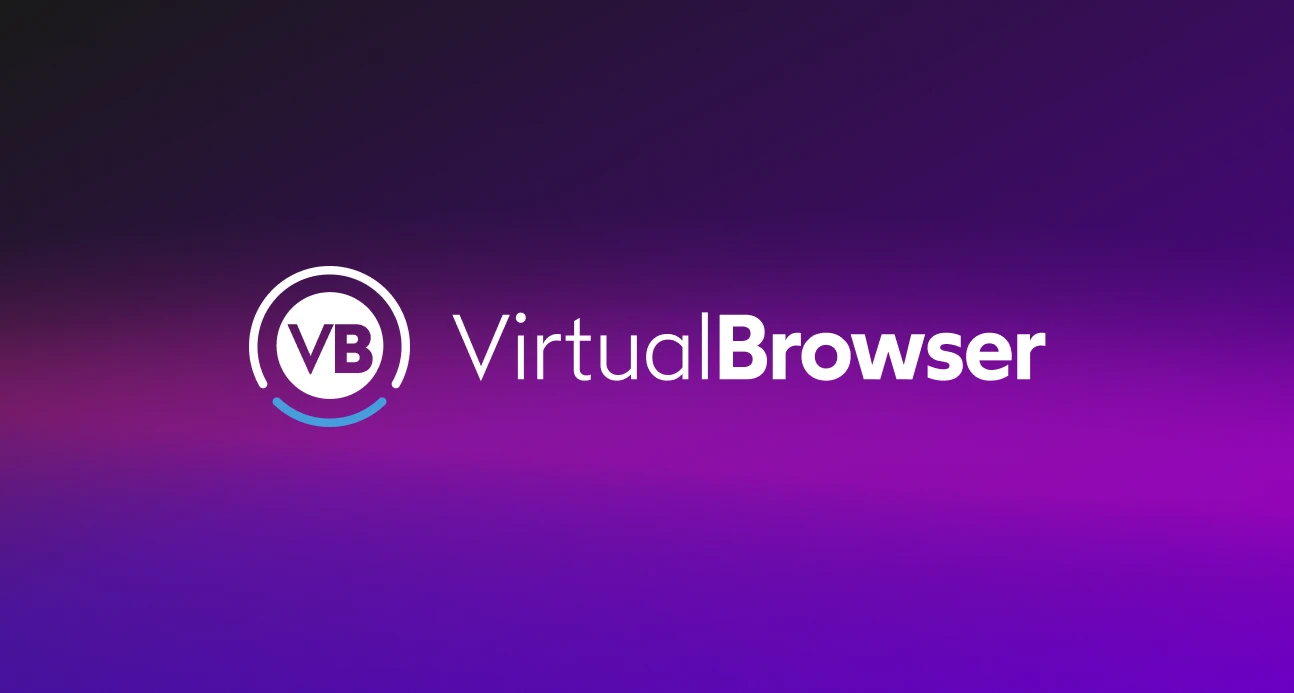
Who Needs a Virtual Browser?
Virtual browsers are not just for tech professionals—they serve a wide variety of users who require privacy, control, and isolation. These browsers are perfect for those whose work involves sensitive data, testing, or the need for secure, anonymous browsing.
Here are some of the people and professions that benefit most from using a virtual browser:
- Cybersecurity Professionals
Cybersecurity Professionals Virtual browsers provide a secure space for investigating threats, safely opening suspicious links, and analyzing malware in an isolated environment. High-profile incidents such as the most recent Jaguar Cyberattack highlight why isolating browsing environments is critical to protecting sensitive systems.
- Web Scrapers and Data Researchers
These tools help automate data collection while evading IP bans and detection, using isolated sessions and rotating identities.
- Multi-Account Marketers
Manage multiple social media, advertising, or eCommerce accounts without worrying about cross-contamination or account bans.
- Journalists and Whistleblowers
Protect your identity and communication when accessing confidential information or reaching out to sensitive sources.
- Enterprises with Strict IT Policies
Ensure secure browsing across teams, limit exposure to phishing attacks, and comply with internal data security standards.
- Developers and QA Testers
Use virtual browsers to test websites and web apps in secure, sandboxed environments, simulating different devices and user profiles.
Use Cases for Virtual Browsers
- Anonymous Browsing: Mask your IP address, location, and device identity for full privacy.
- Multi-Account Management: Keep each login isolated in its own session to prevent overlap or interference.
- Malware Protection: Run websites from the cloud, protecting your local device from potential threats.
- Compliance: Ensure employee access is controlled and data security standards are met.
- Web Testing: Safely run tests in simulated environments without affecting your main system.
- Bypassing Geo-Restrictions: Access content from anywhere without being traced.
Why Use a Virtual Browser for Online Privacy and Security?
As we spend more time online, protecting our privacy and securing our personal data has become essential. A virtual browser offers many benefits that make it an effective tool for privacy protection and online security. Here are some important reasons for using a virtual browser:
- Enhanced Privacy Protection
One of the main virtual browser benefits is its ability to keep your online activity private. It helps prevent websites from tracking your actions and collecting data about you. With virtual browser privacy features, you can browse the web without worrying about being followed by advertisers or hackers.
- Secure Browsing
A virtual browser creates a secure browsing environment by isolating your online activity. This means even if you visit a dangerous site, your device and personal information are kept safe. For example, if you use a virtual browser on a public Wi-Fi network, your sensitive data—like passwords or credit card details—remain protected from prying eyes.
- Protection Against Tracking and Fingerprinting
Many websites use advanced tracking methods like fingerprinting to follow your movements across the internet. A virtual browser prevents these techniques, making it harder for websites to identify or monitor you. This ensures your online privacy is protected, even as you browse different sites.
- Multiple Account Management
If you manage multiple accounts on social media or other platforms, a virtual browser is an ideal solution. It allows you to use separate isolated browsing profiles, each with its own set of cookies and data. This keeps your accounts safe and prevents them from being linked together.
How Virtual Browsers Work: The Technology Behind It
A virtual browser uses advanced technology to provide a secure isolated browsing profile for your online activities. By isolating your browsing from your device’s main system, it ensures that your data and identity remain protected. Here’s how it works:
1. Isolated Browsing Profile and Browser Isolation Explained
- Isolated Browsing Profile: A virtual browser creates an isolated browsing profile that is separate from your device’s operating system. When you use a virtual browser, all your browsing activities happen within this isolated space, making it harder for hackers or websites to access your personal data.
- Browser Isolation: This is the core technology behind a virtual browser. It isolates your browsing from the rest of your device. As a result, even if a website tries to track your data or install malware, it only affects the isolated browsing profile, not your main system. This adds an extra layer of protection to your online experience.
- Security Layers: The browser isolation technology acts like a protective shield. It ensures that no malicious site can touch your real device’s data. For example, websites won’t be able to access your cookies, history, or login details outside of the isolated browsing profile. This keeps your sensitive information safe.
2. How Virtual Browsers Protect Your Data and Identity
- Data Protection: When you use a virtual browser, your personal data is encrypted. This means your sensitive information, like passwords or credit card numbers, is turned into a code that cannot be read by hackers. The encryption keeps your data safe, even when you're browsing potentially dangerous websites.
- Identity Protection: A virtual browser also protects your online identity by masking your real identity. It uses tools like IP address masking to hide your real location, making it harder for websites to trace your activity back to you. This is an essential feature for those who want to remain anonymous online.
- Online Data Encryption: The virtual browser encrypts your online data, so even if hackers manage to intercept your browsing traffic, they can’t read it. This data encryption makes it nearly impossible for anyone to steal your personal information.
Best Virtual Browsers for 2025: Our Top Picks
When it comes to online privacy and security, choosing the best virtual browsers for 2025 is essential. With so many options available, it's important to pick a privacy-focused virtual browser that offers top-tier protection. In this section, we’ll take a look at some of the top virtual browsers for 2025.
Here is the English version of the descriptions for DICloak, Incogniton, Octo Browser, Kameleo, and BrowserStack browsers, including their features, pros and cons, and free plan details:
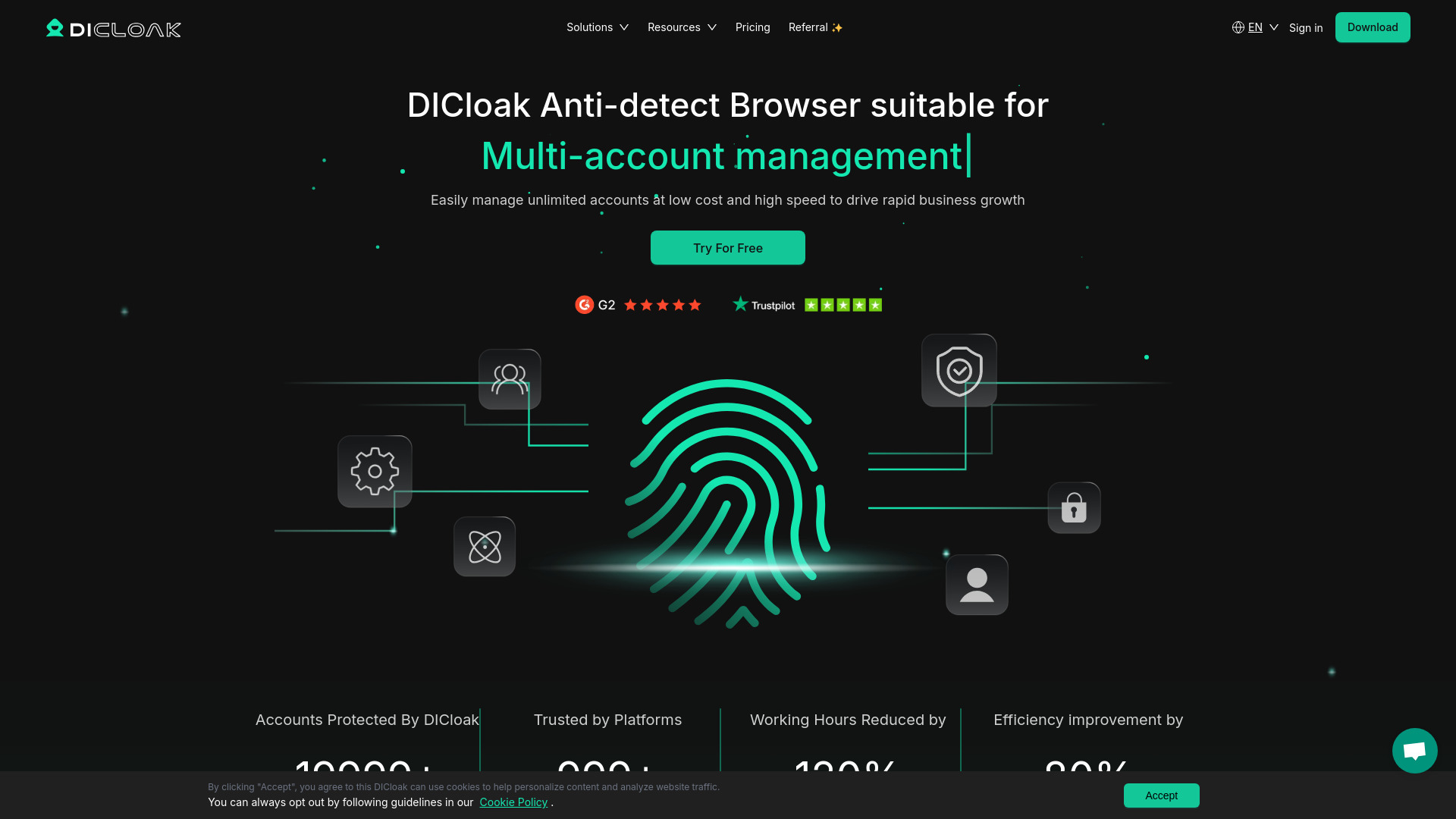
Features:
- DICloak is an antidetect browser designed for privacy protection and multi-account management. It uses browser isolation technology to provide anonymity and data protection.
- It offers an isolated browsing profile for simulating mobile device fingerprints, making it harder for trackers to follow your activity.
- Supports IP address masking to ensure online privacy and protect against tracking.
Pros:
- Multi-account management: Ideal for users managing multiple social media or platform accounts.
- Fingerprint simulation: Helps users bypass various tracking technologies to stay anonymous.
- High security: Ensures safety with browser isolation technology, blocking malicious software and trackers.
Free Plan:
- DICloak offers a free plan with limited features, designed for casual users or those who only need basic privacy protection.
- The free plan includes basic multi-account management, but limits the number of accounts you can manage simultaneously.
- There may be speed restrictions and limited access to advanced features like fingerprint simulation.
- Free plan users can still enjoy browser isolation and IP address masking for secure browsing.
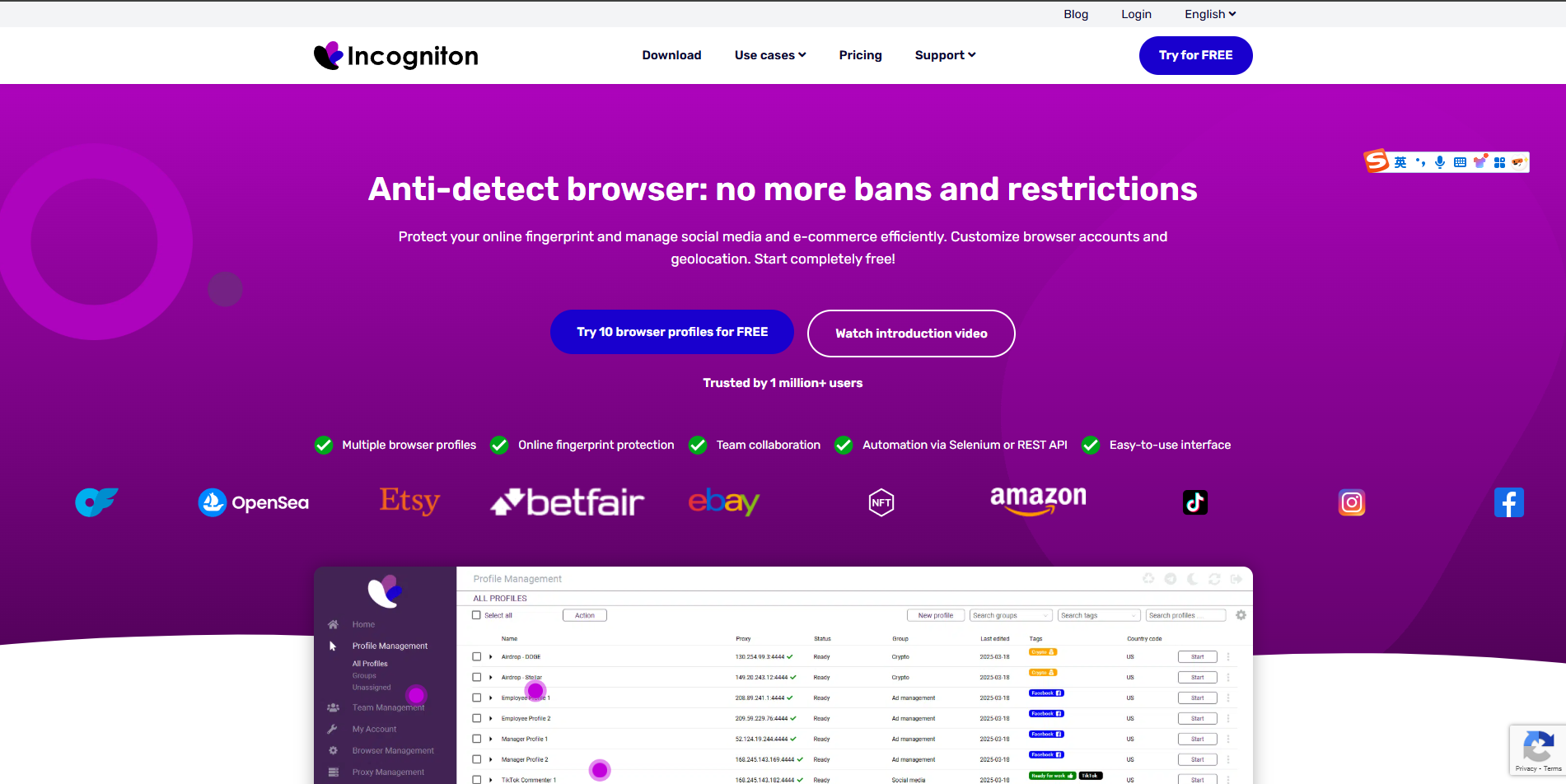
Features:
- Incogniton is a versatile virtual browser designed to protect your identity and browsing history. It focuses on fingerprint protection and allows users to run multiple browser profiles simultaneously.
- It supports browser isolation and multi-account management, helping users hide their online activity with separate virtual identities.
- Incogniton offers proxy support for IP address masking, allowing users to bypass geographic restrictions and stay anonymous.
Pros:
- Advanced Fingerprint Protection: Keeps your online activity secure from trackers and websites.
- Multiple Virtual Configurations: Run different virtual profiles with unique identities, ideal for managing multiple accounts.
- Strong Proxy Management: Supports HTTP, HTTPS, and SOCKS5 proxies, providing robust anonymity.
Cons:
- Pricing: Incogniton’s paid plans may be more expensive for individual users.
- Interface Complexity: The interface might be challenging for beginners to navigate due to its range of customization options.
Free Plan:
- Incogniton offers a free plan with limited features that allows users to test basic functions like running up to 2 virtual profiles.
- The free plan is ideal for casual users or testing purposes but has restrictions on advanced features like fingerprint customization and IP management.
- Limitations: Users cannot access proxy support or multiple browser configurations. After reaching the profile limit, users need to upgrade to a paid plan to unlock additional profiles and features.
- It’s perfect for users looking to explore virtual browser features with minimal investment.
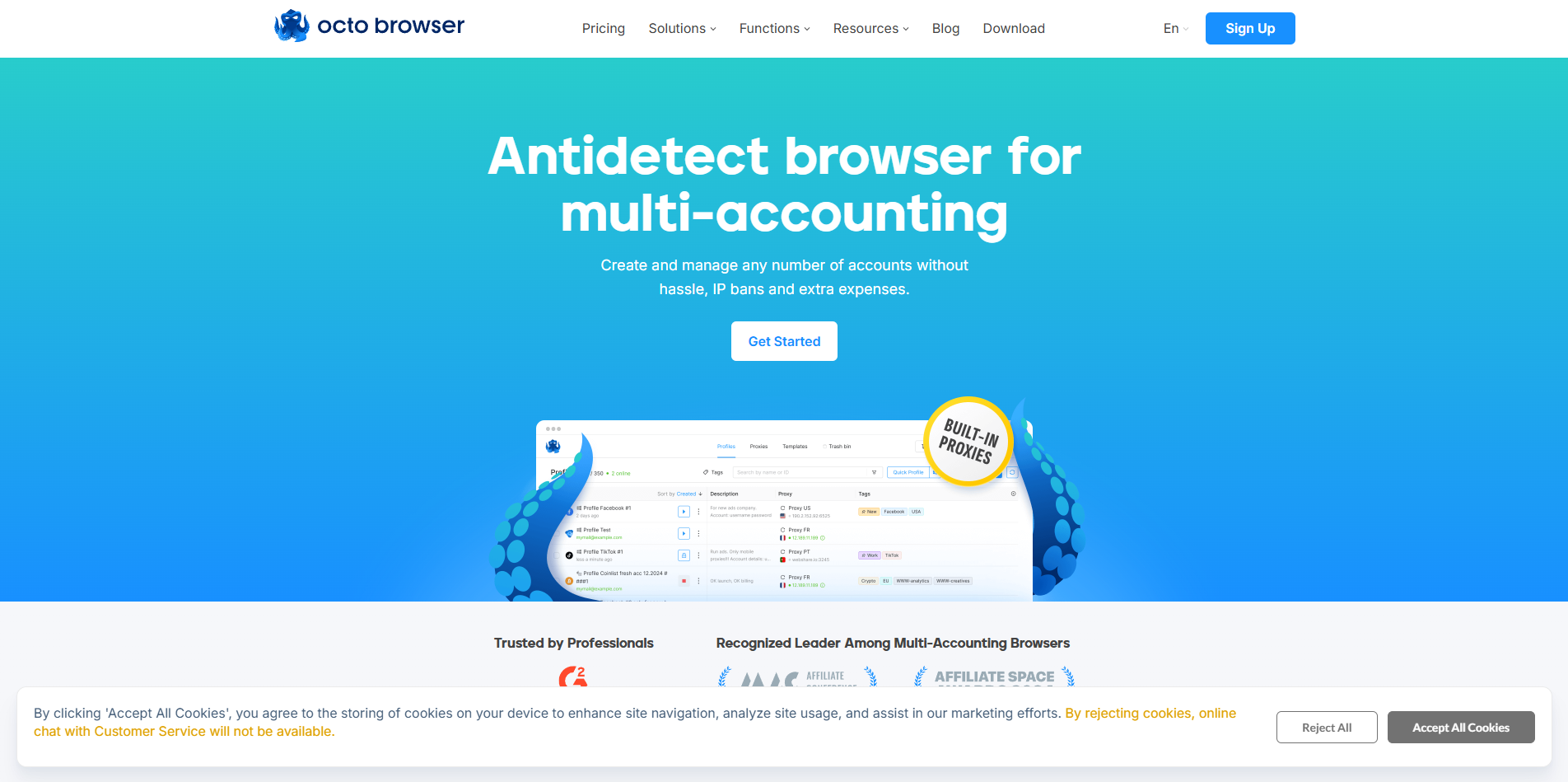
Features:
- Octo Browser is a dedicated virtual browser solution built for security and privacy, offering advanced fingerprinting protection and IP management features.
- It supports running multiple virtual browser profiles at once, each with its own identity, providing strong browser isolation.
- The browser allows for easy management of multi-account setups, perfect for users with many social media or e-commerce accounts.
Pros:
- Fingerprint Customization: Create unique browser fingerprints for each profile to avoid detection.
- Multi-Account Management: Ideal for social media managers, digital marketers, or those managing multiple accounts on various platforms.
- Proxy Management: Advanced proxy features like rotating IP addresses, HTTP/HTTPS, and SOCKS5 support help ensure secure and anonymous browsing.
Cons:
- Cost: Octo Browser’s paid plans are slightly on the higher side compared to competitors.
- Steep Learning Curve: With its advanced settings, new users may face a learning curve to configure profiles effectively.
Free Plan:
- Octo Browser offers a 7-day free trial, giving full access to its premium features like advanced fingerprint protection, IP management, and multi-account management.
- After the trial, users can switch to the Free Plan, which allows up to 1 active profile and limited proxy management features.
- Limitations: The free plan restricts the number of virtual profiles and the number of active sessions. More advanced proxy options and full multi-account support are only available on the paid plans.
- The free plan is perfect for evaluating Octo Browser’s core features but doesn’t offer the full set of tools available on the premium tiers.
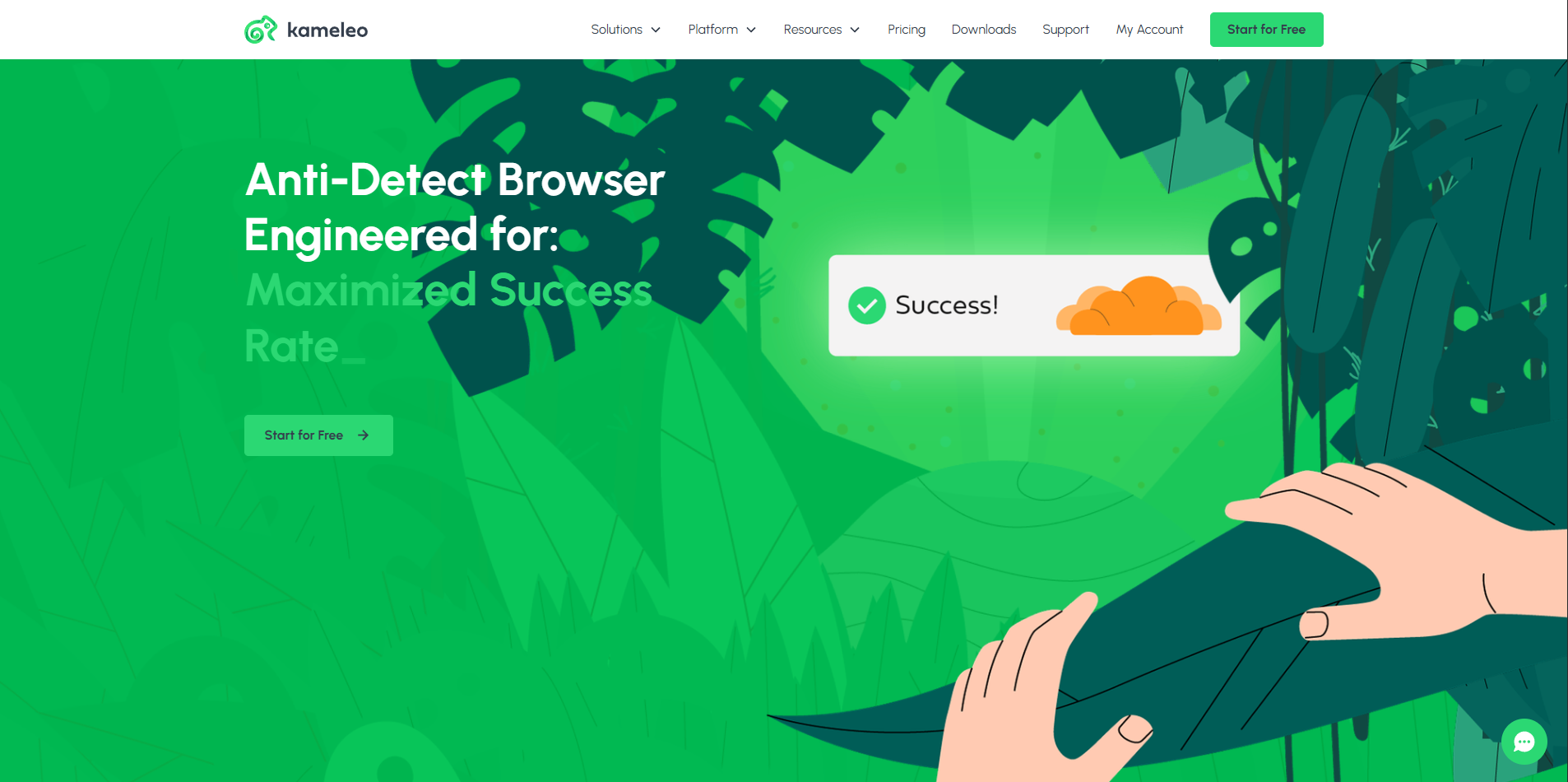
Features:
- Kameleo provides fingerprint simulation and IP address masking to protect user privacy.
- Supports multi-account management, allowing users to run several virtual browsers on a single device.
- Kameleo offers virtual browser customization, letting users adjust settings like proxies, user agents, and screen resolutions to boost anonymity.
Pros:
- Advanced fingerprint simulation and privacy protection make it perfect for anonymous browsing.
- Multi-account support: Great for users managing multiple social media or e-commerce accounts.
- Flexible browser customization: Allows changes to proxies, user agents, and more for better data protection.
Cons:
- Expensive: The pricing might be a concern for users with smaller budgets.
- Complicated interface: Users may face a learning curve when configuring settings.
Free Plan:
- Kameleo offers a free trial that provides access to core features like fingerprint simulation, IP address masking, and basic multi-account management.
- However, the free plan has restrictions on the number of profiles you can create, and the configurations are limited.
- Free trial users may also encounter restrictions on the duration of use, which may be suitable for short-term testing or light users.
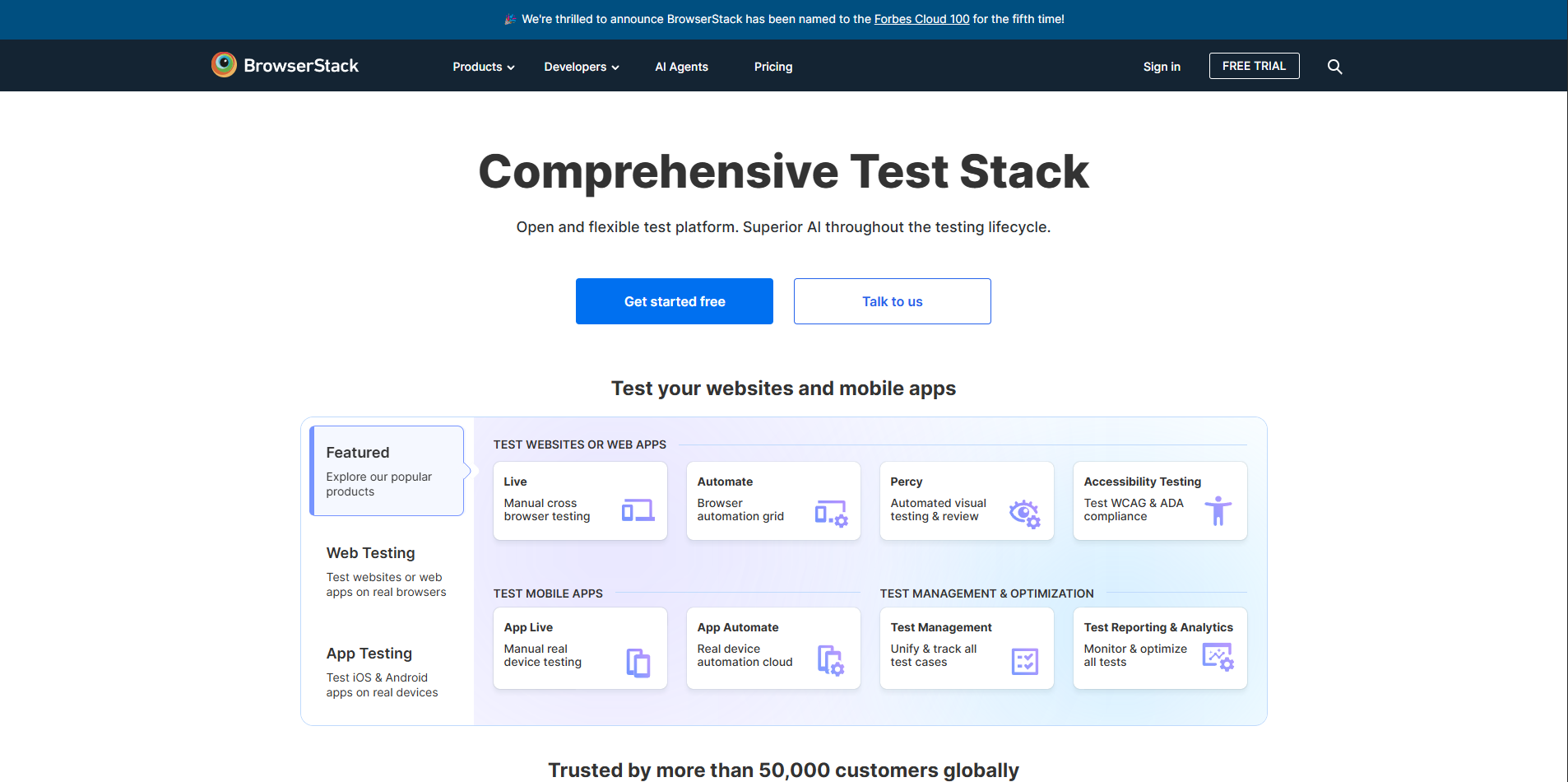
Features:
- BrowserStack is an online virtual browser platform designed primarily for cross-browser testing and website compatibility testing.
- It provides cloud-based virtual browsers for developers to test websites across different operating systems and browsers.
- While not traditionally a privacy browser, it offers virtual environments for testing websites, indirectly supporting online privacy during development.
Pros:
- Cross-browser testing: Developers can test their websites for compatibility across different browsers.
- Real-time debugging and screenshot capabilities are excellent for developers and QA teams.
- Supports multiple operating systems, making it versatile for various testing needs.
Cons:
- Primarily for developers and testers, it lacks specific features for privacy protection.
- Does not support multi-account management or dedicated privacy features for everyday users.
Free Plan:
- BrowserStack offers a 7-day free trial, but it is primarily geared towards developers and testers.
- The free plan gives full access to its cross-browser testing tools, allowing users to test websites across various browsers and operating systems.
- Free trial users get limited access to testing time and may not have access to all browsers or operating systems. The free plan is best suited for short-term, testing purposes rather than ongoing privacy or multi-account management.
How to Get Started with a Virtual Browser: A Step-by-Step Guide
Using a virtual browser is straightforward, but to fully maximize its features for privacy, security, and efficient profile management, there are a few essential steps to follow. Below is a simple guide to get you started with a web-based virtual browser, showcasing key features that can elevate your browsing experience:
1. Sign Up and Log In
The first step is to sign up for an antidetect browser service. Typically, you’ll need to create an account using your email address and a password. Some platforms may also offer single sign-on (SSO) options for easier access.
2. Create Virtual Profiles
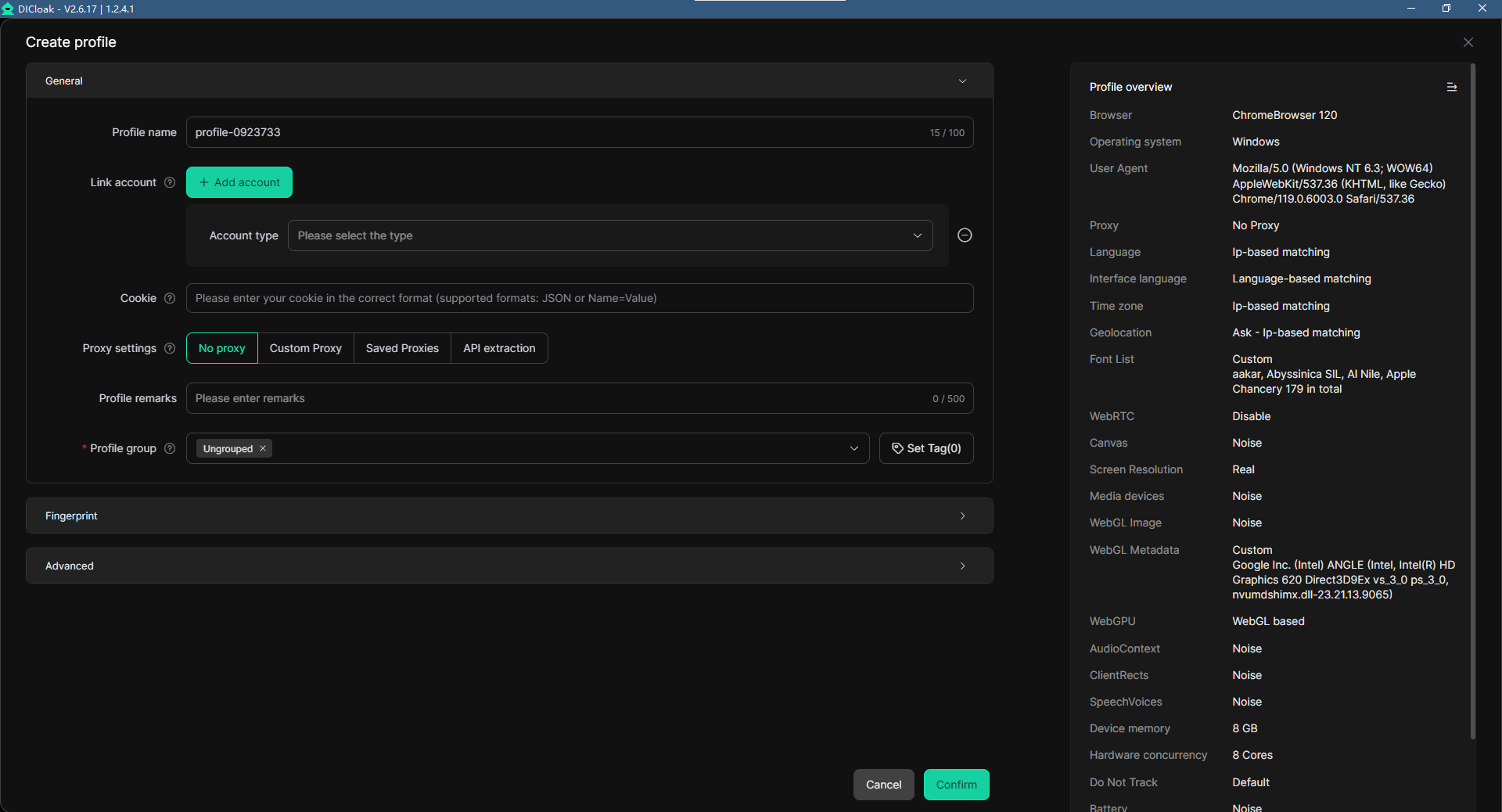
After logging in, you can begin creating virtual profiles. For instance, with DICloak, you can create a profile and configure it with specific accounts. You can modify important attributes like browser fingerprint, cookies, and other device information to simulate a completely different online identity.
This feature allows you to manage multiple accounts without any risk of detection or cross-linking. Each profile operates in isolation, ensuring that personal data, session history, and login credentials remain separate for each virtual identity. This way, you can maintain anonymity and safely run multiple accounts on the same platform.
3. Configure Proxy Settings
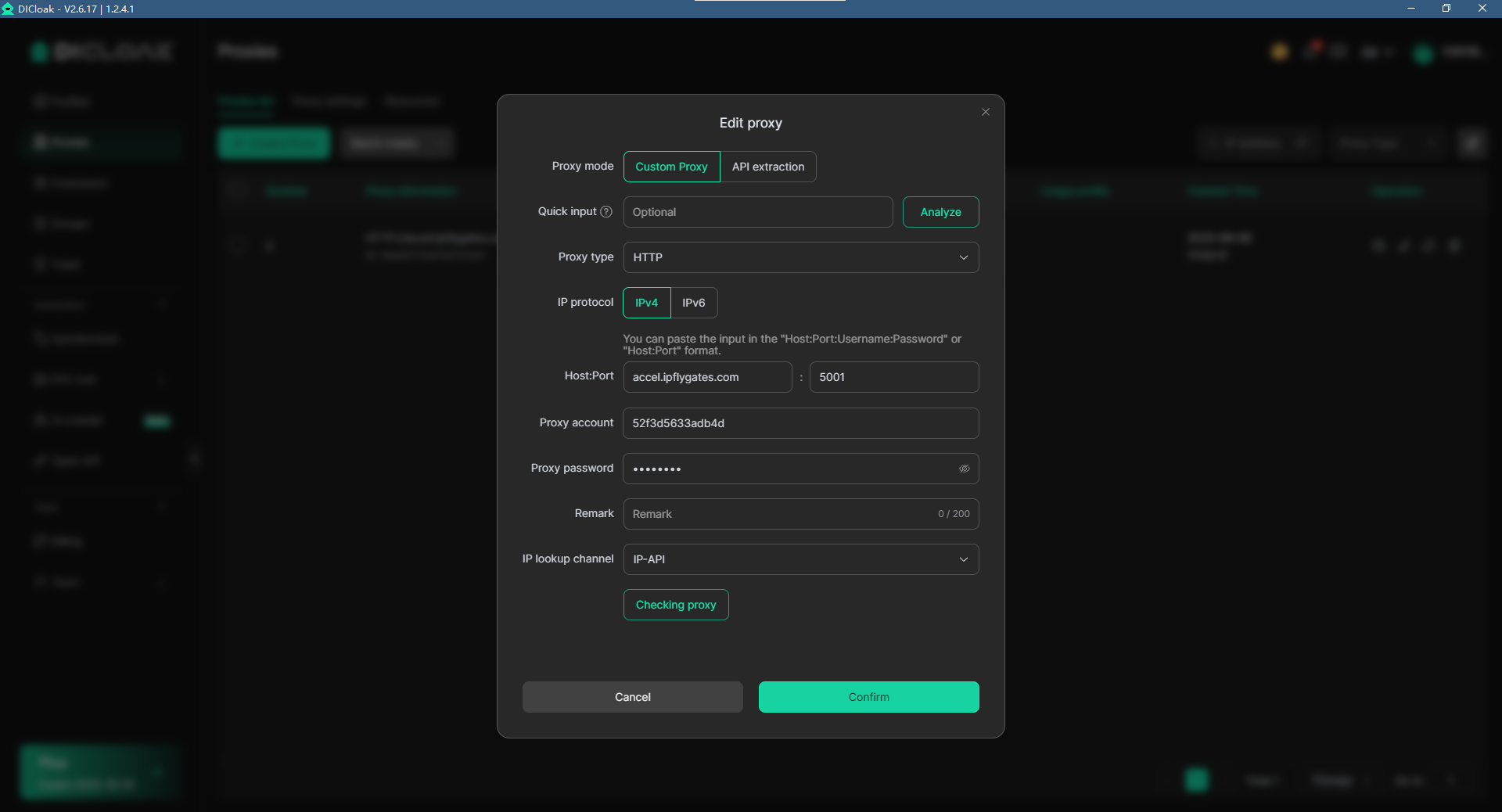
Once your profiles are set up, it’s time to enhance your proxy settings. Platforms like DICloak allow you to adjust not just browser fingerprints but also configure proxies to mask your IP address. This additional layer of protection makes it harder for trackers to identify or follow your browsing activities.
By hiding both your device information and your IP address, you ensure true anonymity. This multi-layered security approach minimizes the risk of data collection or tracking, allowing for a much safer online experience.
4. Website Access Through Profile and Window Synchronization
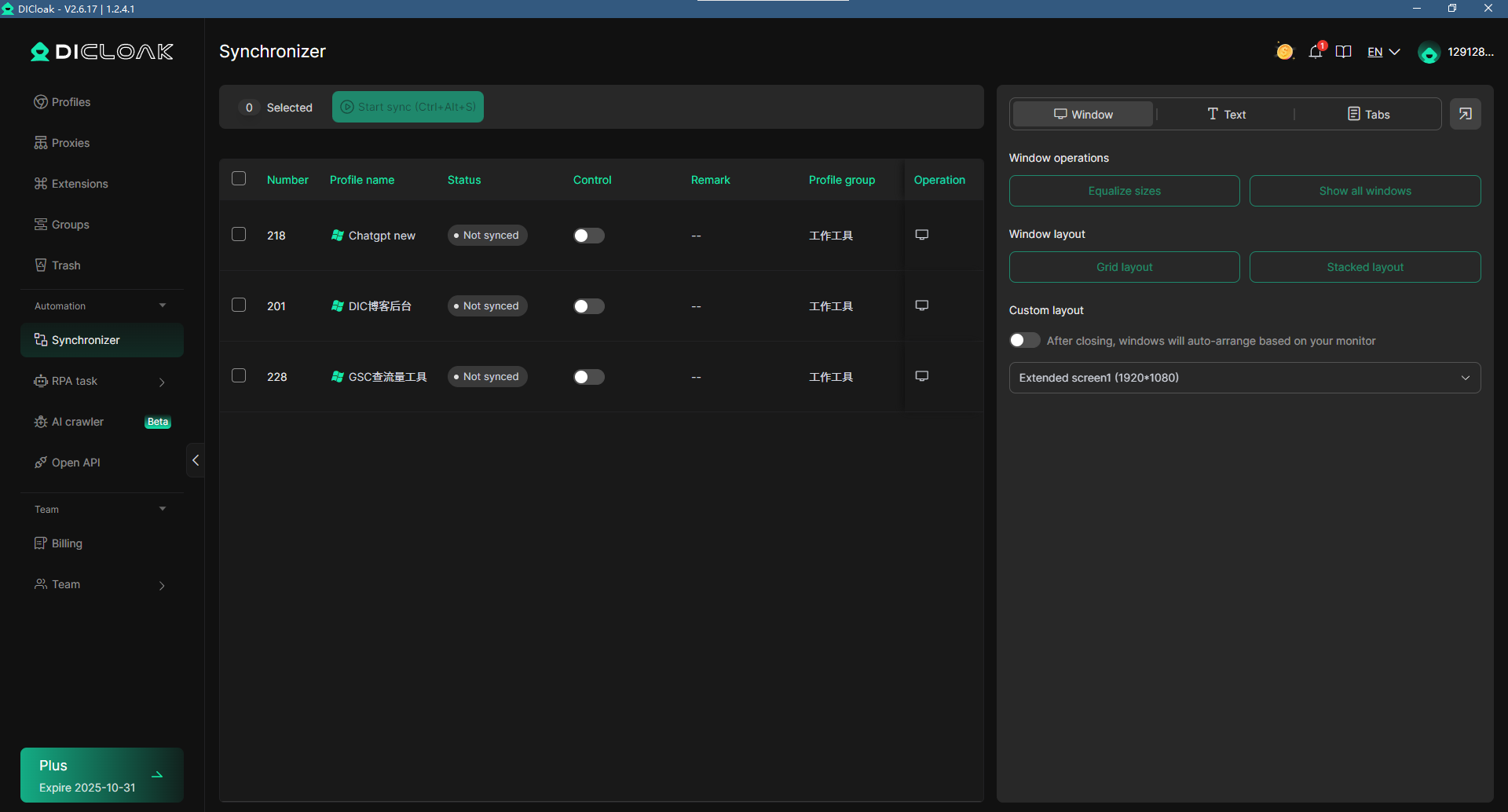
With your profiles and privacy settings configured, you can start browsing. The antidetect browser will operate under the unique identity of the profile, including the device fingerprint, IP, and other customized settings.
DICloak offers a special window synchronization feature, which lets you open multiple profiles at once, each running securely in its own isolated profile. This makes it easy to manage various accounts simultaneously while maintaining complete privacy. Whether you're browsing social media, shopping online, or researching, your identity remains masked, and your activity stays private.
5. Automate Tasks (Optional)
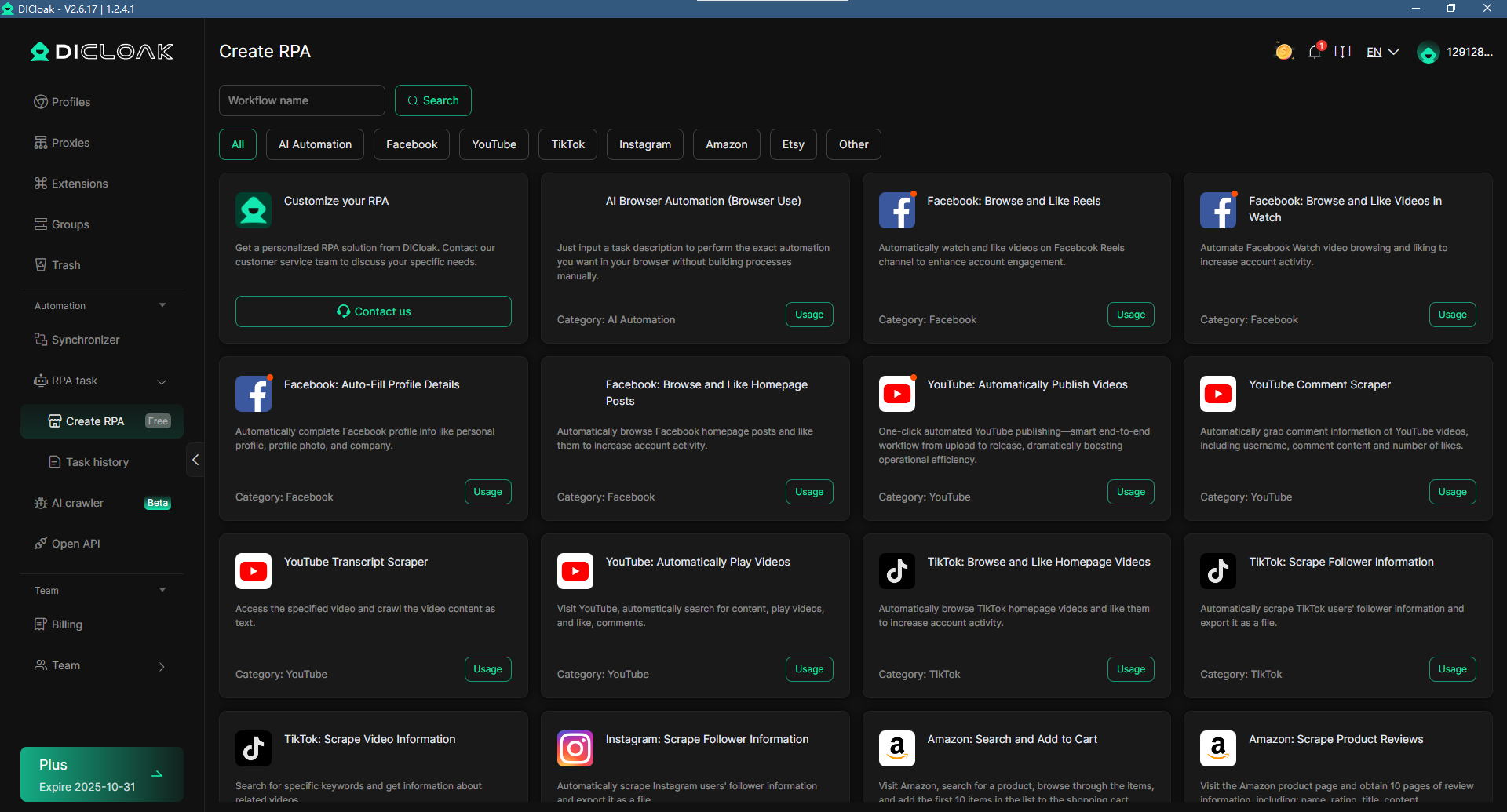
Many virtual browsers, including DICloak, offer automation tools to streamline repetitive online tasks. With features like window synchronization, RPA (Robotic Process Automation) templates, and AI-powered crawlers, you can automate tasks such as filling out forms, logging into multiple accounts, and even scraping data from websites.
These automation tools help you perform tasks quickly and efficiently, saving time and minimizing manual effort. Once set up, the virtual browser will handle these tasks for you, enabling you to focus on more important activities.
6. Monitor and Manage Your Profiles
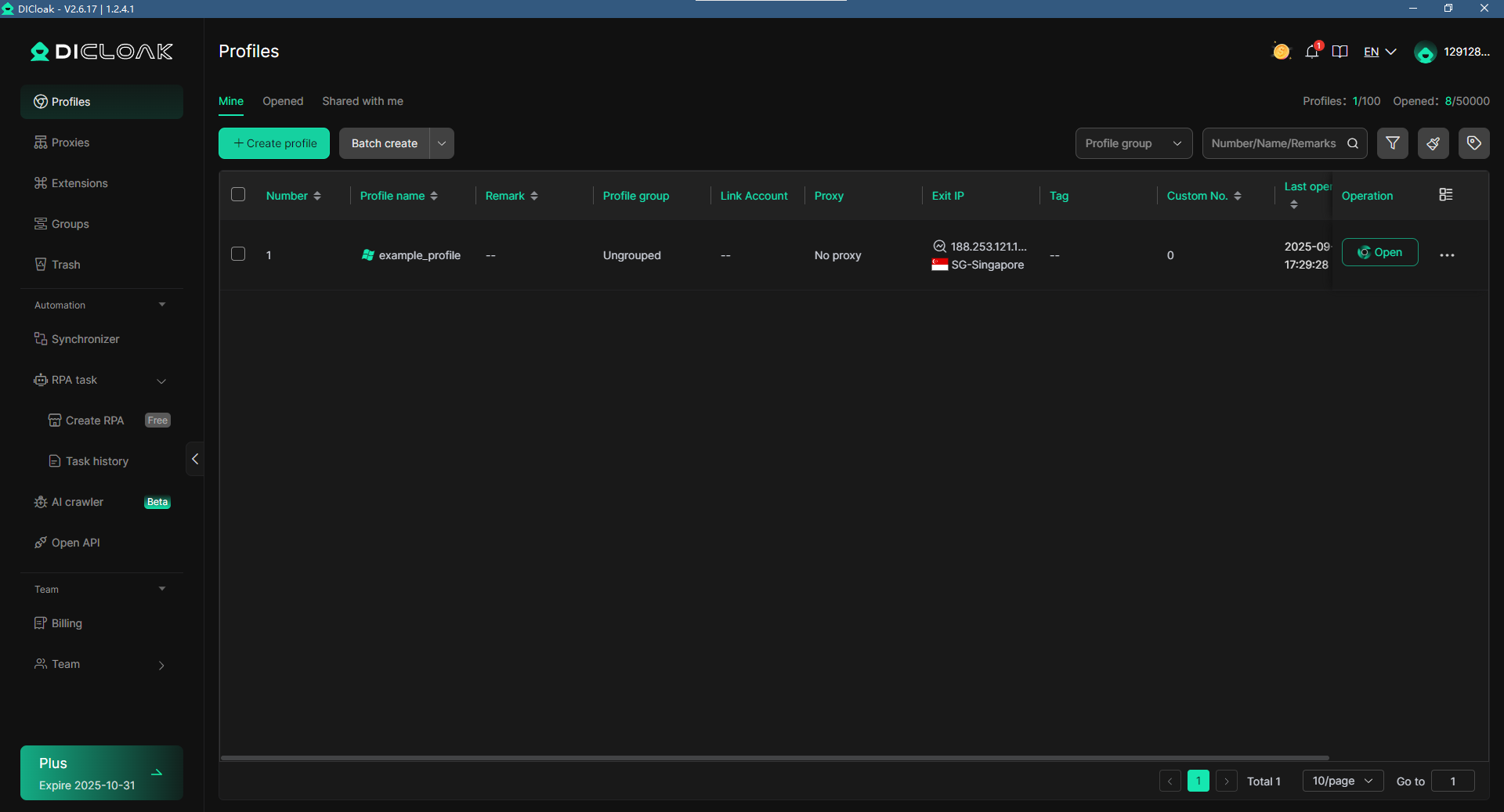
Managing your virtual profiles is crucial for ongoing efficiency. Regularly monitoring your profiles, updating settings, and adding or removing profiles is essential to maintaining a smooth experience.
With DICloak, profile management is simplified through advanced batch operations, allowing you to quickly create, configure, and link multiple profiles. The comprehensive dashboard makes it easy to monitor all your profiles in one place, ensuring smooth and organized operations.
Conclusion
A virtual browser is essential for protecting your online privacy and security in 2025. It isolates your browsing activity from your main device, preventing tracking, data leakage, and malware attacks. With features like fingerprint simulation, IP masking, and multi-account management, a virtual browser helps you browse anonymously and securely. Whether you're concerned about privacy or managing multiple accounts, using a virtual browser provides a safer and more efficient online experience. It's an invaluable tool for anyone seeking enhanced privacy protection and secure browsing.
FAQ
What is a virtual browser?
A virtual browser isolates your browsing activity from your main device, protecting your data and privacy by preventing tracking.
How does a virtual browser protect my privacy?
It uses features like fingerprint simulation and IP masking to ensure your online activity remains anonymous and secure.
Can I manage multiple accounts using a virtual browser?
Yes, virtual browsers allow you to create separate profiles for each account, keeping them isolated and secure.
Are there free virtual browsers available?
Yes, platforms like DICloak offer free plans with basic privacy features like browser isolation and IP masking.